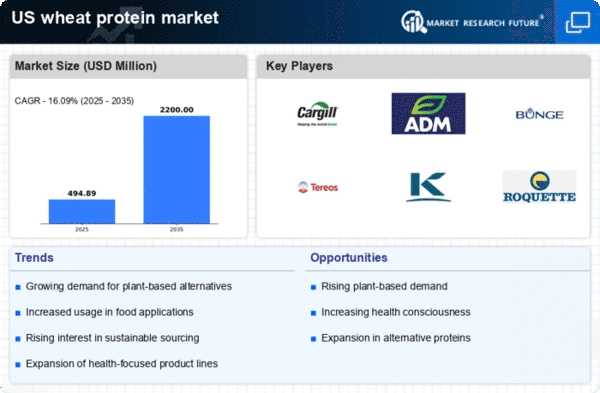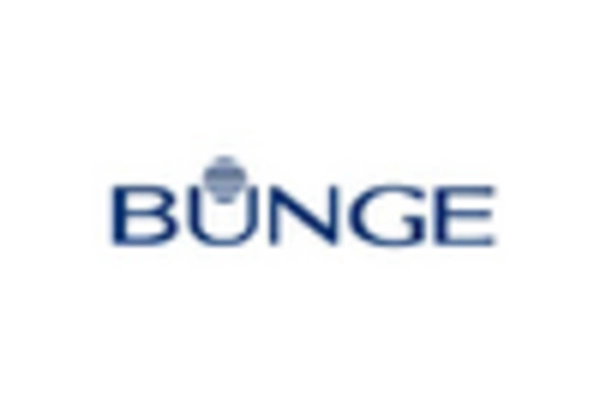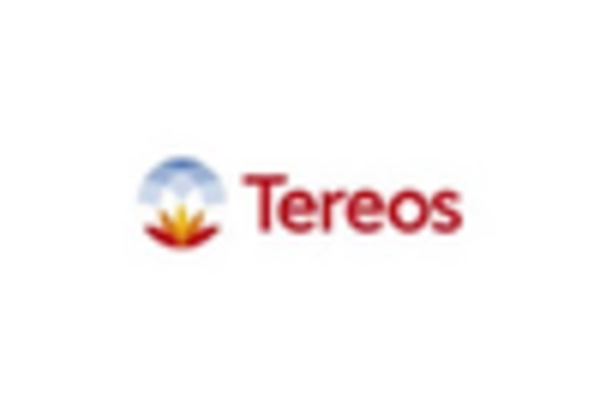Expansion of Food Applications
The versatility of wheat protein in various food applications is a notable driver for the wheat protein market. It is utilized in a wide range of products, including baked goods, snacks, and meat substitutes. The food industry is increasingly recognizing the functional properties of wheat protein, such as its ability to enhance texture and improve moisture retention. This adaptability is reflected in market trends, with the food and beverage sector accounting for a substantial share of the wheat protein market. As innovation continues, manufacturers are likely to explore new applications, further driving the demand for wheat protein in diverse culinary contexts.
Health Consciousness Among Consumers
The increasing awareness of health and wellness among consumers appears to be a pivotal driver for the wheat protein market. As individuals seek healthier dietary options, the demand for plant-based proteins, including wheat protein, is likely to rise. This trend is reflected in market data, indicating that the plant-based protein segment is projected to grow at a CAGR of approximately 8% through 2027. Consumers are gravitating towards products that offer nutritional benefits, such as high protein content and low fat. Consequently, manufacturers in the wheat protein market are responding by developing innovative products that cater to this health-conscious demographic, thereby expanding their market reach and enhancing product offerings.
Technological Advancements in Production
Technological advancements in the production of wheat protein are poised to enhance the efficiency and quality of the wheat protein market. Innovations in extraction and processing techniques are enabling manufacturers to produce higher-quality wheat protein with improved functional properties. These advancements may lead to cost reductions and increased production capacity, thereby making wheat protein more accessible to a broader range of consumers. As the market evolves, these technological improvements are likely to play a critical role in shaping the competitive landscape of the wheat protein market, allowing companies to meet the growing demand for plant-based protein products.
Sustainability and Environmental Concerns
Sustainability is becoming a crucial consideration for consumers and manufacturers alike, impacting the wheat protein market. As environmental concerns grow, there is a shift towards sustainable protein sources, with wheat protein being viewed as a more eco-friendly alternative to animal-based proteins. The wheat protein market is likely to benefit from this trend, as it aligns with the increasing consumer demand for sustainable food options. Additionally, wheat cultivation generally requires fewer resources compared to livestock farming, making it an attractive choice for environmentally conscious consumers. This focus on sustainability may drive innovation and investment in the wheat protein sector.
Growth of the Vegan and Vegetarian Population
The rising population of vegans and vegetarians in the United States is significantly influencing the wheat protein market. As more individuals adopt plant-based diets for ethical, environmental, or health reasons, the demand for wheat protein is expected to increase. Recent statistics suggest that approximately 5% of the U.S. population identifies as vegan, with a growing number of individuals reducing meat consumption. This shift in dietary preferences is prompting food manufacturers to incorporate wheat protein into various products, including meat alternatives and protein bars. The wheat protein market is thus likely to benefit from this demographic change, as it aligns with the increasing consumer preference for plant-based protein sources.
.png)
















